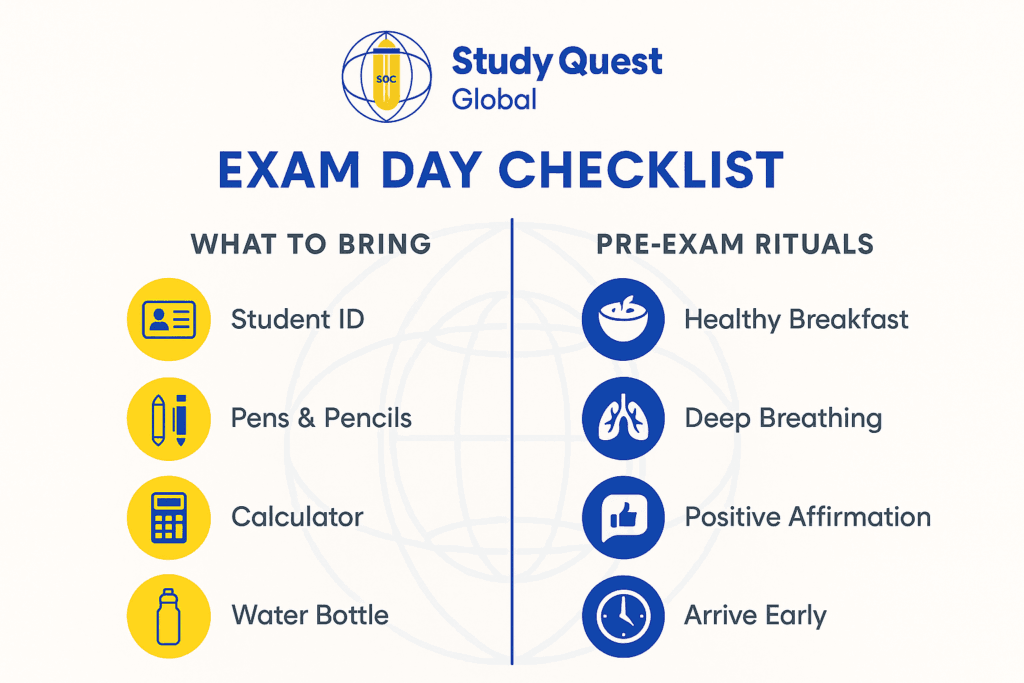The Ultimate Guide to Acing IGCSE, GCSE & IB Exams
Preparing for IGCSE, GCSE, or IB exams can feel overwhelming—but with the right approach, you can turn stress into success. In this guide, we’ll walk you through everything from understanding exam formats to mastering revision techniques. Whether you’re tackling IGCSE sciences, GCSE English, or IB Higher Level Mathematics, these strategies will set you on the path to top marks.

1. Know Your Exam Format Inside Out
IGCSE vs. GCSE vs. IB:
IGCSE/GCSE: UK-based qualifications taken typically at age 16; assess knowledge through written papers, coursework, and practicals.
IB (International Baccalaureate): Two-year diploma with internal assessments, Extended Essay, Theory of Knowledge (ToK), and six subject exams.
Why it Matters: Tailor your revision to the weighting of papers (e.g., Paper 1 vs. Paper 2), and understand mark schemes to maximize points.
2. Create a Strategic Study Plan
Audit Your Subjects: List every topic you need to cover and flag your weakest areas.
Set SMART Goals: Specific, Measurable, Achievable, Relevant, Time-bound targets per revision session.
Use a Revision Timetable:
Block out school/college hours, co-curriculars, and leisure.
Allocate 45–60 minutes per study block with 10-minute breaks.
Track Progress: Tick off completed topics and adjust weekly to stay on pace.
3. Adopt Effective Revision Techniques
Active Recall: Quiz yourself on key concepts rather than passive rereading.
Spaced Repetition: Review flashcards at increasing intervals to solidify memory.
Past Paper Practice:
Download specimen and past papers from official exam boards (e.g., Cambridge IGCSE, AQA GCSE, IB OCT).
Time yourself under exam conditions.
Mark against official mark schemes to identify gaps.
Mind Maps & Diagrams: Condense large topics (e.g., biological processes, historical timelines) into visual summaries.
4. Subject-Specific Strategies
Mathematics & Sciences:
Memorize formula sheets, units, and scientific constants.
Practice numerical problems daily—accuracy beats speed.
Languages (English, Literature, Foreign Languages):
Build vocabulary lists and model essays.
Annotate unseen passages using PEEL (Point–Evidence–Explain–Link).
Humanities & Social Sciences:
Create timelines for History; compare economic models for Economics.
Use case studies to ground theoretical concepts.
5. Mastering Exam-Day Performance
Morning of the Exam:
Eat a balanced breakfast (protein + whole grains).
Arrive early to minimize last-minute stress.
Time Management in the Hall:
Skim the paper first—tackle high-value questions.
Allocate minutes per question and stick to it.
Stress-Busting Techniques:
Deep-breathing exercises before and during the exam.
Positive self-talk: remind yourself, “I’ve prepared for this.”
6. Leverage Professional Support
Struggling to stay on track? Study Quest Global offers tailored services to boost your exam readiness:
Online Study Program: Interactive live classes and recorded lectures covering core IGCSE, GCSE, and IB syllabi.
Study Abroad Consultation: For students targeting UK, US, or European high schools that require IGCSE/GCSE qualifications.
Career Counseling & CV/Resume Writing: Craft compelling personal statements and UCAS/IB application essays.
Tip: Book your free consultation today to create a personalized revision roadmap aligned with your goals.
7. Frequently Asked Questions
How early should I start revising?
Begin at least 3–4 months before exams, intensifying in the final 6–8 weeks.Are group study sessions effective?
Yes—peer teaching can uncover blind spots, but ensure sessions remain focused.What’s the best way to handle exam anxiety?
Regular mock exams and mindfulness practices can dramatically reduce stress.
Study Abroad
- Germany
- Italy
- Sweden
- United Kingdom
Online Programs
- IGCSE/GCSE
- International Baccalaureate
- O & A Levels
- Exam Preperation
- Edexcel
- AQA
Copyright 2025 , All rights reserved.
- Privacy Policy
